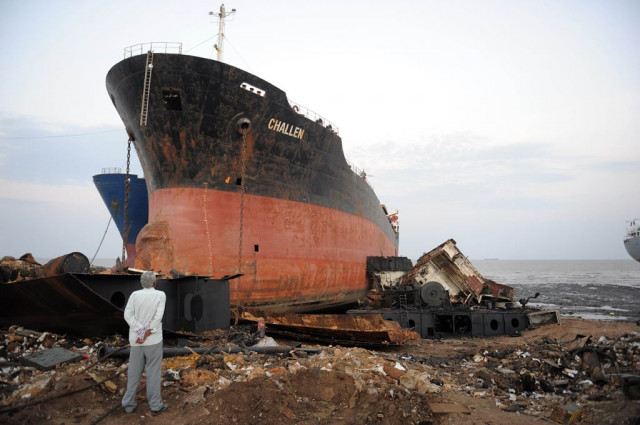Despite hard times, Pakistan remains a top ship breaking destination
In 2013, 1,119 ships went to the world's breaker's yards.

In terms of numbers, the three South Asian countries accounted for 50 percent of ships, but in terms of tonnage, they accounted for 71 percent, Robin des Bois said. PHOTO: AFP/FILE
In 2013, 1,119 ships went to the world's breaker's yards, a decline of 16 per cent over 2012 which was an "exceptional year," the environmental watchdog Robin des Bois (Robin Hood) said.
The figures "confirm that the ship demolition sector is in good health," Robin des Bois said.
It is the second highest tally since 2006, when the group began compiling annual reports in an effort to boost transparency in a sector with a contested environmental record.
In terms of number of ships demolished, the three South Asian countries accounted for 50 per cent of ships torn down in 2013.
India, being the world leader, tore 343 ships, or about 26 per cent of total ships demolished.
Bangladesh and Pakistan stood third and fifth in the list with 210 and 104 ships or 16 and eight per cent respectively.
In terms of tonnage, the three South Asian countries accounted for 71 per cent of the worlds scrapped ships. India came in at the top with 2.8 million tonnes or 31 per cent of total metal recycled globally, while Bangladesh and Pakistan accounted for 2.3 million (25 per cent) and 1.4 million (15 per cent) respectively.
[infogram url="" height="650"]
India headed the list in both categories, but China was also a big player, ranking second in the number of ships that it demolished and third in terms of tonnage. Pakistan came in fifth (by number of ships) and fourth (by tonnage).
Turkey captured a significant market as it came in fourth by number of ships, tearing down 136 ships (10%) and fifth by tonnage with 514,000 tonnes (six per cent).
Of the 1,119 ships, 667 were scrapped after being held at ports, along with their crew, for failing to meet international safety standards, the report said.
"Port inspections are playing a solid role in cleaning up the world's merchant fleet," it said.
Roughly a third of ships that were broken up were bulk carriers, while container ships accounted for one in six - a sharp rise over the last six years.
According to the report, out of 1119 ships that were scrapped in 2013, 387 were bulker, 245 cargo, 180 container ships, 164 containers and 39 Ro Ro.
[infogram url="" height="625"]
Environmental concerns
South Asia has long been a graveyard for merchant ships, but it also carries a reputation for poor safety and environmental hazards.
The European Union has approved regulations requiring large EU-flagged vessels to be recycled at approved facilities.
Robin des Bois described the intention as "pious," given that only eight per cent of such vessels were scrapped at European yards in 2013, and many European ships were given a flag of convenience by their owners for their last voyage.



















COMMENTS
Comments are moderated and generally will be posted if they are on-topic and not abusive.
For more information, please see our Comments FAQ